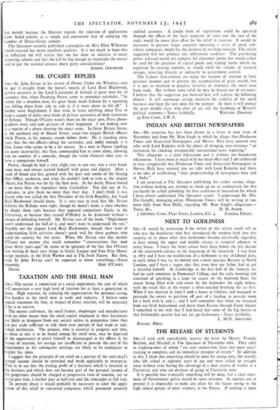TAXATION AND THE SMALL MAN
Sai,—The nation is committed to a social experiment, the cost of which will necessitate a very high level of taxation for at least a generation or more. High taxation, by reducing the opportunities for personal saving, hits hardest at the small man in trade and industry. I believe some special treatment for him, in respect of direct taxation, will be necessary if he is to survive.
The master craftsman, the small farmer, shopkeeper and manufacturer with no other means than the small capital employed in their businesses are likely to disappear from our society unless in prosperous times they can -put aside sufficient to tide them over periods of bad trade or indi- vidual misfortune. The pioneer, who is essential to progress and who, as often as not, is to be found among the small men, may be deprived of the opportunity to prove himself or discouraged in his efforts if, by reason of taxation, his savings are insufficient to provide the cost of his experiments or his subsequent earnings are likely to be inadequate to exploit his ideas.
I suggest that the principle of tax relief on a portion of the individual's earned income should be extended and made applicable to enterprise. That is to say that the trading profit of a business which is retained in the business and which does not become part of the personal income of the proprietors should be charged at progressive rates of taxation, say an initial part free, a further part at half-rate and the remainder at full rate.
To prevent abuse it would probably be necessary to limit the appli- cation of this relief to registered companies which presented properly audited accounts. A simple form of registration could be operated through the offices of the local inspector of taxes and the cost of the audit would be more than offset by the relief in taxation. It would be necessary to prevent larger concerns operating a series of small sub- sidiary companies simply for the purpose of avoiding taxation. The reliefs suggested will not produce any inflationary tendency The purchasing power released would not compete for consumer goods, but would either be used for the purchase of capital goods and trading stocks which are regulated by existing controls, or would swell the volume of national savings, reverting directly or indirectly to government control.
The Labour Government are using the weapon of taxation to limit personal incomes and to prevent the accumulation of great wealth, but it is not its intention to penalise initiative or eliminate the small man from trade. But without some relief he may be forced out of existence. I believe that the suggestion put forward here will achieve the following objects: It will encourage saving, maintain the stability of the small business and keep the way open for the pioneer. In short it will protect the great middle class, who after all are still the backbone of Britain's political economy.—Yours faithfully, WINSTON DRAPKIN. 54 Eyre Court, N.W. 8.


























 Previous page
Previous page